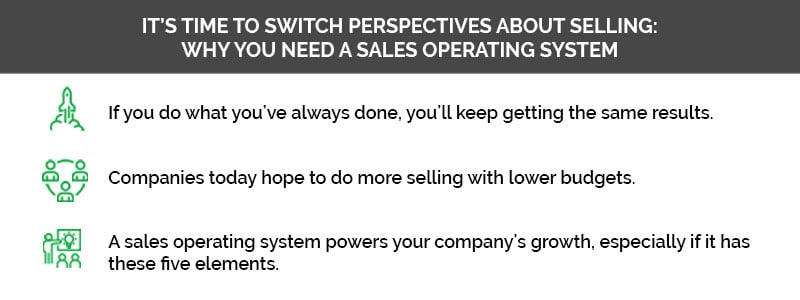It’s Time to Switch Perspectives About Selling: Why You Need a Sales Operating System

A sales operating system could be the main driver and heartbeat of your company’s explosive growth. Here’s everything you need to know about them.

Every business aims to grow, but that growth can cause problems. One drawback of rapid growth is that most departments are unprepared to make the necessary changes to cope with new demands. One second your sales department can wing it with no guiding principles or systems in place, and the next it’s all it can do to simply stay afloat because the company has grown so much and old rules no longer apply.
For companies experiencing rapid growth, the need for systems is paramount – even more so for your sales team. The department needs to ditch its old ways in favor of a sales operating system. Here’s why:
Changing perspectives about selling
Change is never easy. It rips you out of familiar frameworks and expectations and into the unknown. It’s unpleasant even when it’s for your own good, and involves a process many entrepreneurs and founders would rather avoid.
It is thus understandable why many have yet to change the way they think about and execute in selling. Many founders are part and parcel of the entire sales process, from setting appointments to closing and training new recruits. As your company grows, though, it becomes increasingly difficult to maintain the same momentum. You’re now being pulled in a thousand directions by added responsibilities and changing expectations in other departments. Something has to give.
Here’s the truth about being stuck in “founder selling.” It never gets easy, and it never stops – unless you take on a new perspective about sales and let others take the sales role off your plate.
Evolving sales expectations
Changing your perspective about sales is no longer an option. It’s a must, given the evolution that is currently sweeping companies. Here’s what to know about the shifts taking place:
- In the old days, a higher budget was usually made available to hire more sales reps to do the extra work required for success once a team met its set quota and the boss set a higher target.
- It was a nice system, but it’s decidedly on the way out.
- Whether you work for a large organization or an SMB, meeting your established sales goals would likely still lead to loftier goals for your team going forward – but you’ll be expected to achieve this using the same budget (or even a smaller one).
- As a CEO and founder, you probably understand why this is the case better than those you currently have in your sales department.
- Depending on the industry, your company may need to maintain a balance between generating revenue through sales and investing to retain customers or increase your share of their wallet.
- At the very least, you need an eye on reducing operating costs and raising the bottom line.
Business owners expect their sales teams to do more than set appointments and close deals, though. Reps must form meaningful relationships with customers and prospects, then supplement these relationships with customer data for maximum impact. Owners expect new, strategic lead generation methods that mean less time and resources spent cold calling and more time with customers. This ultimately leads to fewer issues and reduced churn.
These lofty expectations are the reasons you need to look at sales in a new way. They call for a different perspective when organizing and managing sales. You need a sales operating system to drive the sort of intentional growth you desire in today’s business climate.
How a sales operating system powers growth
When people hear “operating system,” they think computers. The OS keeps your computer running as it should, and does it so well that only the most tech-savvy users notice it. The same can be said about a sales operating system: Under the hood of every successful sales department would be the components needed to keep everything running like clockwork. This includes:
- A strategic plan: A strategic plan encompasses different things for different companies, but yours should consist of targets or measures such as volume of sales and close rates, a plan for meeting those targets, and data that offers a granular view of customer demographics such as account size, location, and industry sector.
- A sales investment portfolio: This covers key issues like budget, training, and other resources needed to execute the strategic plan.
- Talent management: This covers your plan to ensure recruitment of new sales reps that are a right fit for your company culture, and enablement tools to help with their development.
- Demand catalyst: This has to do with how your sales department liaises with others like marketing and product developments to generate leads, qualify them, and feed information back into the loop after the close to fine tune the process and generate more demand.
- Performance measurement: This involves establishing and measuring the right KPIs, as well as managing processes based on data-backed insights to optimize the sales team’s performance.
As with a computer or smartphone, getting the operating system right means smooth operations, while getting it wrong means you’re left with a worthless piece of junk on your hands. Sometimes the best first step is to get assistance from experts who can help you decide what’s best for your business.
Install a smooth-running sales operating system with expert help
A successful sales operating system can be a major driver of rapid growth for your company. MetaGrowth Ventures can help you select processes, implement the right steps, and train your sales team on the tools necessary to build the world-class group you need to break free from “founder selling.”
Contact our team today to learn more.
Written by
Joe Arioto
